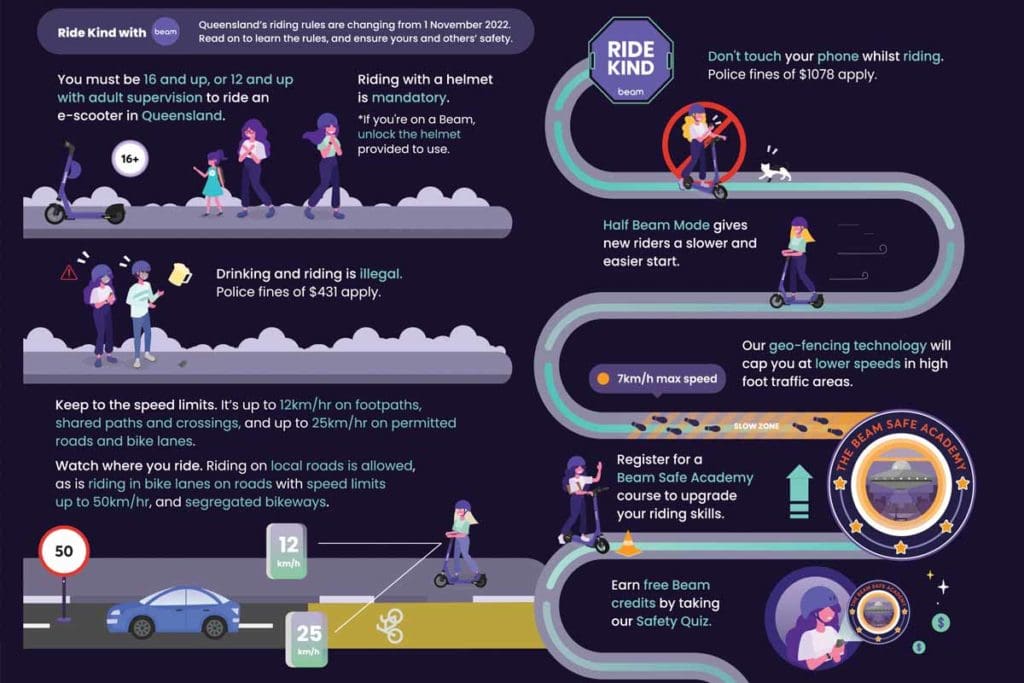New E-Scooter Laws Enacted in Queensland

Brisbane, Queensland
New rules and increased penalties for people riding e-scooters and other personal mobility devices in Queensland came into force on Tuesday.
The changes include:
- Reducing speed limits to 12kmh on footpaths and shared paths, unless otherwise signed. The 25kmh limit remains for all other infrastructure, including bike infrastructure and local streets.
- Increasing fines of up to $1,078 for dangerous offences involving speed, illegal road use and holding a mobile phone while riding.
- Riding personal mobility devices in bike lanes on roads with a speed limit of 50km/h or less, and all on-road bike lanes that are physically separated is now allowed.
- Making bells compulsory for personal mobility devices with handlebars.
- Aligning personal mobility device riders with bike riders to ensure they are required to follow general road rules, such as stopping at red lights.
In anticipation of the new laws, share scooter provider Beam launched a rider education campaign ahead of Queensland’s new e-rideables legislation being introduced next week.
The ‘Ride Kind’ campaign, featuring Queenslanders explaining the riding rules, aims to ensure all riders understand their responsibilities when riding and parking a shared e-scooter, and the penalties for non-compliance.
Beam is Queensland’s largest shared e-scooter operator, with operations in Brisbane, Logan, Mackay, Port Douglas, Townsville and Magnetic Island.
Rider education of the new rules is at the forefront of Ride Kind. However, the company’s e-scooter operations do not rely solely on rider responsibility and police compliance, with Beam investing heavily in shared e-scooter technology for additional oversight of rider use.
Geofencing technology restricts where Beam vehicles can operate by designating specific operating areas, low-speed and no parking areas.
Beam’s e-scooters are speed restricted and have 24-hour GPS tracking. Helmets included with every vehicle are fitted with technology to detect if the helmet has been used with a trip and issue warnings to riders who break the rules.
“A three-strikes policy ensures those breaking the rules face warnings, suspensions, or permanent bans when caught breaking the law,” according to a statement from the company.
Wider Trial for Pedestrian Shield
Beam last week launched its first widespread deployment of its Pedestrian Shield technology in Australasia, following limited trials in six Australian cities.
The company introduced its path detection technology in Auckland, after last week securing a new contract to operate in the Auckland Council area until 2024.
Beam says the Auckland roll-out is part of a wider trial to inform further deployment of Pedestrian Shield in other NZ and Australian locations.
A statement from Beam said the expanded roll-out is a big step along the pathway to significantly improving road-rules compliance and pedestrian safety through technology, and is a first for the southern hemisphere.
“Through this partnership with Auckland Council, we will also be able to collect data on rider behaviour, road obstacles and high traffic areas to further assist our automation technology into the future,” Beam General Manager (ANZ) Tom Cooper said.
Authorities cited Beam’s pedestrian, rider safety innovations and a focus on influencing rider behaviour as key factors in awarding Beam the permit..
“We welcome the higher standards of innovation they have set for the industry as a whole,” Tom said.
Beam e-scooters were among the first to have inbuilt safety mechanisms such as ‘geofencing’, which ensures the device will stop working if it travels outside of a set zone and blocks rider access to areas of high foot-traffic.
Under the new deal, Beam will be the one of only two shared micromobility providers in the NZ capital from November 4.
To date Beam e-scooters have travelled more than 13.5 million kilometres in Australia and New Zealand, with operations in over 25 local government areas.
Join the Conversation
Are the new Queensland laws a step in the right direction?
